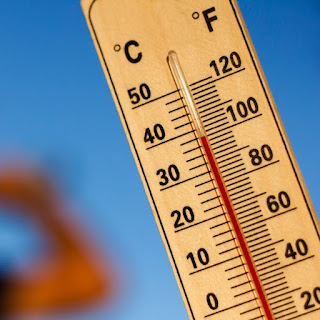So if the heat (and humidity) affects a short run so easily, how much does it affect us when we race?
When running in hot weather, we need more oxygen since some of the blood flow is redirected from working muscles to the skin to cool us down. This requires more energy usage, increases lactic acid production and a higher heart rate at a given pace compared to cooler weather.
Warmer weather can also cause us to fatigue faster by making us sweat more. This can lead to reduced stroke volume, cardic output and blood pressure.
Research has shown that the optimal temperature range for most groups of runners are between 7-15 degrees Celsius (or 44 to 59 degrees Fahrenheit). Below and above this range, marathon finishing times tend to be slower on average.
Most published research studied elite marathoners timings. At the Boston marathon (Miller-Rushing et al, 2012) more than two-thirds of the men and women's course records were set below 13.3 degrees Celsius (56 degrees Fahrenheit). More than a third were set when the temperature was under 9 degrees Celsius (48 degrees Fahrenheit).
The top 10 fastest marathon performances of all time were set when temperatures were between 10-15 degrees Celsius (50 to 59 degrees Fahrenheit).
However, I found a comprehensive study (El Helou et al, 2012) that included data from the Paris, London, Boston, Chicago and New York Marathons. The researchers found that most non elite runners (finishing times between 3:30 and 5:00 hours) performed best at temperatures around 6.67 degrees Celsius (44 degrees Fahrenheit).
Once the temperature is higher than 15 degrees Celsius (59 degrees Fahrenheit), perceived effort rises and pace slows for most runners. Runners averaging 5:45 min per mile pace slowed approximately 1 second per mile for each 1 degree Celsius (1.8 degrees Fahrenheit) increase in temperature.
You can use this information on race day for your pace. Say you are capable of a 3:30 hrs marathon. You will need to add 2 to 2.5 seconds to your race day pace for every degree above 15 degrees Celcius (59 degrees Fahrenheit).
Those who averaged between 7:25 to 10:00 per mile slowed between 4 to 4.5 seconds per mile for 1degree Celsius (1.8 degrees Fahrenheit) higher than 15 degrees Celsius (59 degrees Fahrenheit).
Optimal running performances for women tend to be at the cooler end of the range (especially for faster female runners. Women tend to be less affected by rising temperatures than men since women (and elite runners) tend to be lighter. They will usually have lower metabolic heat production due to their lower body mass and their higher surface area to body mass ratio. Less energy is then needed to cool the body, this translates to less stress on the cardiovascular system.
Faster runners also spend less time exposed to hotter temperatures (since they finish ealier) which may be a reason they are less affected than slower runners.
The only consolation is that running in the heat does get easier (especially for those of us who live here in Singapore) with repeated exposures to running in the heat (Lorenzo et al, 2010). If you race in a cooler climate, chances of a faster time is much higher.
Organizers of the Singapore International Marathon used to offer a 1 million dollar bonus to world class runners to break the break the world record here. Rumour has it that the organizers (back in 2014) tried to convince Haile Gebrselassie to make an attempt but was turned down immediately after he learnt about our temperature. He did agree to run the 10 km event though and won it.
Now you know that it will never happen. I do not even think a sub 2:10 hrs run will be possible given our heat and humidity.
References
El Helou N, Tafflet M, Berthelot G et al (2012). Impact Of Environmental Parameters On Marathon Running Performance. PLoS One. 7(5): e37407. DOI:10.1371/journal.pone.0037407.
Ely MR, Cheuvront SN and Montain SJ (2012). Neither Cloud Cover Nor Low Solar LoadsAre Associated With Fast marathon Performance. Med Sci Sports Ex. 39(11): 2029-2035. DOI: 10.1249/mss.0b013e318149f2c3.
Lorenzo S, Halliwill J, Sawka M et al (2010). Heat Acclimation Improves Aerobic Performance. J App Physiol. 109:1140-1147. DOI: 10.1152/japplphysiol.00495.2010.
Miller-Rushing AJ, Primack RB, Phillips N et al (2012). Effects Of Warming Temperatures On Winning Times In The Boston Marathon. PLoS One. 7(9): e43579. DOI:10.1371/journal.pone.0043579.
*Note that wind, wet-bulb temperature, dew point, precipitation and cloud cover can affect running performance to some degree. But none of them have more influence than air temperature.






